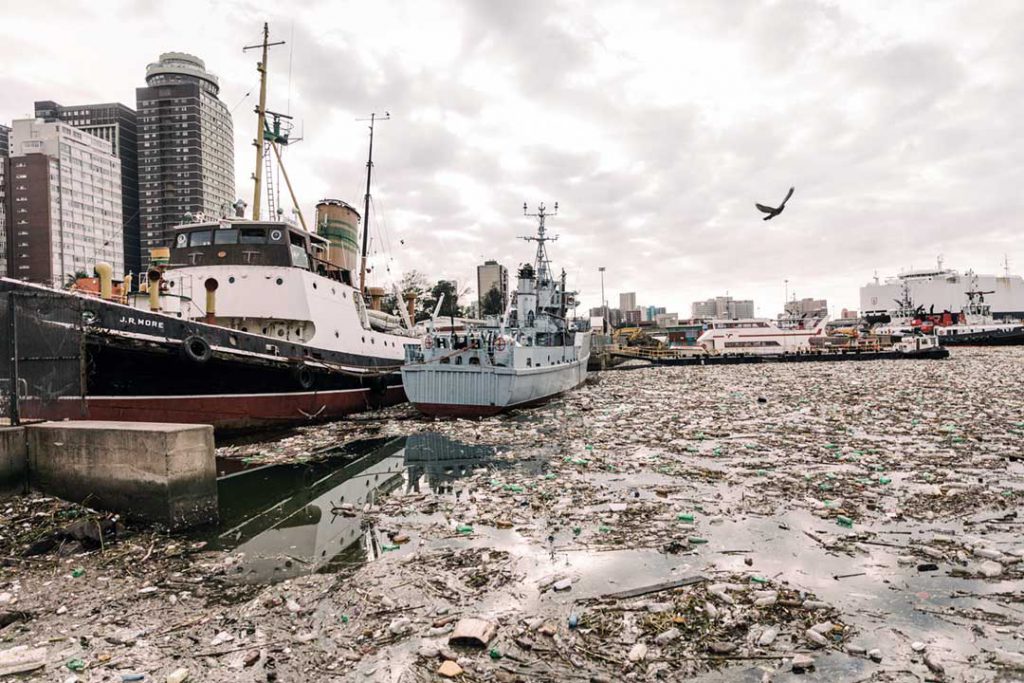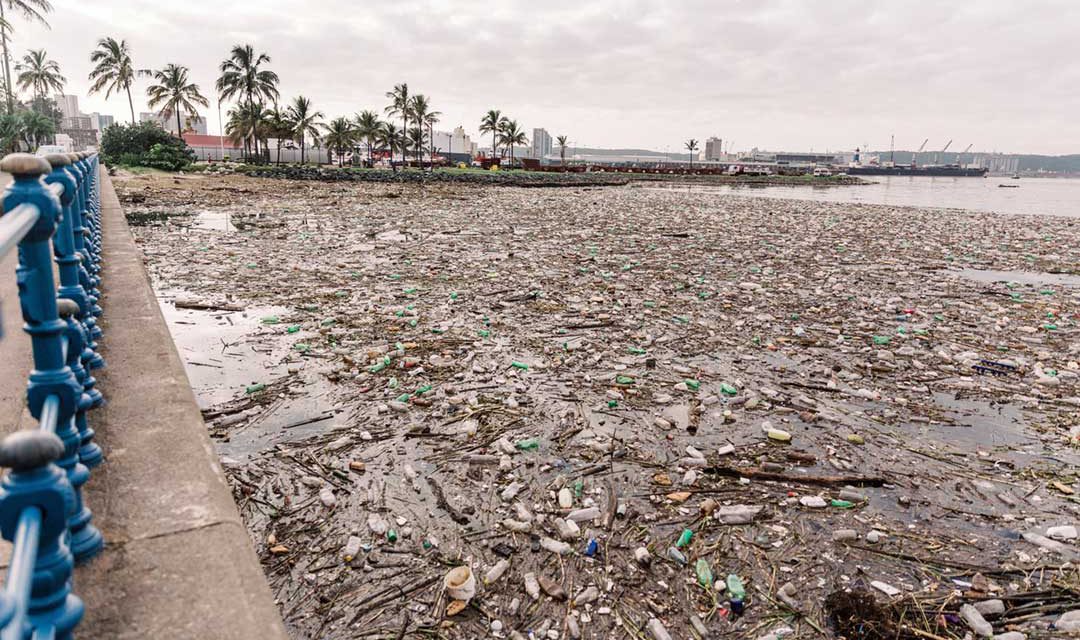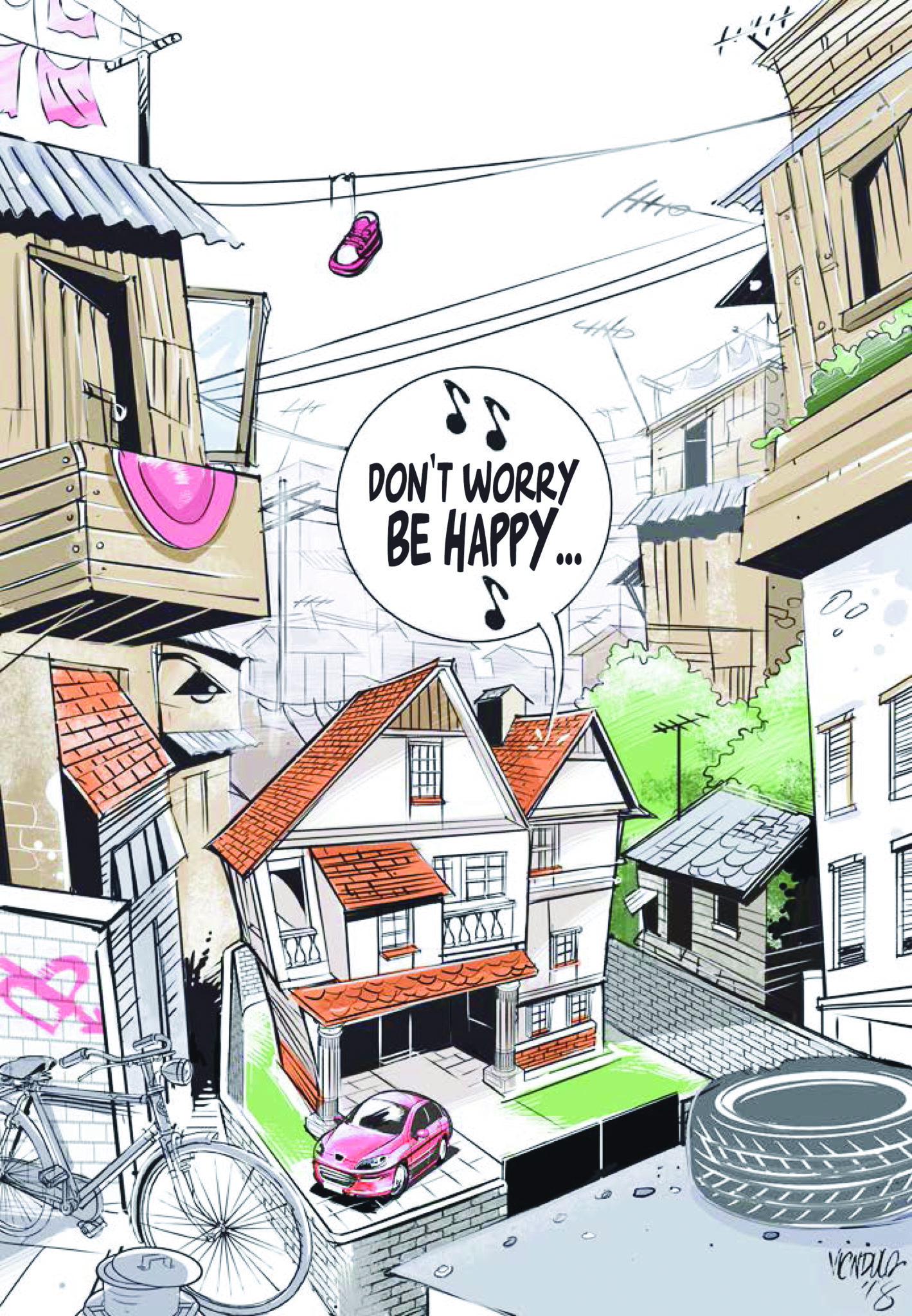SDG 12: Responsible consumption and production
African governments show little interest in coming up with sustainable waste management strategies

Tons of debris, mostly plastic and wood, swamped the Port of Durban, on April 28, 2019. Transnet National Ports Authority (TNPA) has commenced a major clean-up to remove the large volume of waste and vegetation from the port after the recent heavy rains and flooding. Around 70 people have been killed in devastating floods in South Africa, an official said on April 25, 2019 while 1,000 people have been forced from their homes. Heavy rains have lashed the southeast of the country, tearing down homes and ravaging infrastructure in KwaZulu-Natal (KZN) and Eastern Cape provinces. The debris included large logs that posed a threat to the safe navigation of the harbour craft which are used to guide vessels safely in and around the port. Three vessels were unable to berth or sail in the Maydon Wharf precinct. Environmentalist groups, Green Peace and the Bremen-Durban Marine Environmental Education Network also weighed in, urging people to #BreakFreeFromPlastic and to take notice of where and how people dispose of their plastic waste. RAJESH JANTILAL / AFP
By Charles Kimani
Waste generation rates are rising across the world. Data from the World Bank shows that at least two billion tonnes of solid waste, translating to 0.7 kg per person a day, was produced in major cities in 2016. With rapid population growth, coupled with meteoric urbanisation, yearly waste generation is forecast to rise by 70% from 2016 levels to 3.4 billion tonnes in 2050. Developing countries are likely to be hit hard by this new development, particularly the urban poor who face the severe impact of unsustainably managed waste. A UN Economic Commission for Africa report, 2018 Africa Sustainable Development Report: Towards a Transformed and Resilient Continent, observes that in low-income countries, most of which are in Africa, more than 90% of waste is disposed of at unchecked dumpsites. Poorly managed waste sites have become a breeding ground for disease and contributing to global climate change through toxic gas generation. They also promote urban violence as is intermittently seen at Nairobi’s 46-hectare Dandora dumpsite, the largest in East Africa. Since 2000, the dumpsite has been controlled by 12 groups of street children, who refer to themselves as Majeshi (armies). Fights are common between the different Majeshi, and sometimes end only when someone is killed. The dead are then buried in the garbage. According to the police in Nairobi, the Dandora gangs use weapons, including guns, to protect their “sections” of the site. “These [waste sites] create serious health, safety, and environmental consequences,” Professor Geoffrey Wahungu, director general of Kenya’s National Environment Management Authority (NEMA), told Africa in Fact. In Dandora, people staying near the garbage site suffer from lung-related diseases, as well as diarrhoea and cholera.”
Properly managed waste is an essential foundation for sustainable and liveable cities, Wahungu argues. But in most African countries effective waste management is expensive, estimated at between 20% and 50% of total municipal budgets, according to an April 2019 World Bank brief, Understanding Poverty: Solid Waste Management. The situation is compounded by a lack of comprehensive legislation to back waste management. In Abuja, the capital of Nigeria, for instance, numerous private waste collection companies are in operation, each with a specified route and specific time for waste collection. But the practice is often marred by inconsistencies due to human-resource shortages, an insufficient number of collection trucks and delayed or non-payment to service providers, among other issues. Similar scenarios play out in Nairobi, Johannesburg, Kampala, Lagos, Dar es Salaam and other African cities. Such budgetary constraints have compelled financial institutions like the World Bank to step in and support African waste management. In Liberia, for instance, $10.5 million has been committed to improving waste collection and to constructing a new landfill and transfer stations. A similar initiative has been launched in Burkina Faso, where the World Bank has supported the solid waste sector with more than $67 million in loans since 2005. The capital city, Ougadougou, now collects an average of 78% of the waste generated in the city, as compared to the 46% average for sub- Saharan Africa. But even with the challenges, some African countries are encouraging industries, businesses and consumers to recycle and reduce waste as they strive to move towards a more sustainable pattern of consumption by 2030. In 2017, Kenya announced the world’s toughest ban on plastic bags. That same year, in March, Tunisia also banned the use of plastic bags, leading environmentalists to celebrate the resultant lower pollution levels.
Almost two years since the embargo, Kenya’s waterways are clearer, the food chain is less contaminated with plastic and there are fewer “flying toilets” (plastic bags used for defecation in the slums that are then thrown onto roofs), according to NEMA. A Private waste management company based in Nairobi is also encouraging waste recycling. TakaTaka Solutions says it fetches waste from businesses and households and recycles 95% of what it collects. Company CEO Daniel Paffenholz claims this is one of the highest recycling rates in the world. Fishermen on the coast and on Lake Victoria are seeing fewer bags entangled in their nets due to the ban on plastics, notes NEMA, and Uganda, Tanzania, Burundi and South Sudan are now considering following Kenya’s example. Taking the growing pace of technological developments into consideration, the Southern African Development Community (SADC), a grouping of 16 southern African states, has drafted guidelines on e-waste disposal. The guidelines identify the sources of e-waste and prescribe procedures for e-waste handling. Yet some African countries – Ghana, Morocco, Algeria, Botswana and Swaziland among them – continue to produce more waste every year, despite efforts to make the continent habitable, according to the UN’s Africa Review Report on Waste Management published in October 2016. In Gambia, another offender in this regard, government waste disposal efforts have been supplanted by private initiatives, described by some as “vigilantes”. There, the most common form of waste management is burning, which is in itself hazardous. Proper waste disposal facilities are scarce in the West African country. Urban authorities in Africa are facing solid waste challenges, with the amount of waste generated exceeding their collection and disposal capacity, both technical and financial, says Erias Lukwago, Lord Mayor of Kampala.
“Uganda is facing rapid urbanisation, at 5.1% per year. This has led to overcrowding and the fast growth of slums and informal settlements with poor waste management practices,” Lukwago told Africa In Fact. He says Kampala’s waste management has been severely hampered by a complex land tenure system, with many tenants not having the right to the land they occupy. This, he says, provides little or no incentive to manage waste domestically. The Kampala Capital City Authority’s capacity to deal with waste has been “overwhelmed”, Lukwago acknowledges. Of the 1,400 tonnes of waste generated a day, only 400 tonnes are collected, a collection efficiency of only 29%. This means almost 71% of the solid waste generated daily is not properly collected and disposed of and is instead indiscriminately disposed of by members of the public. The struggles African countries experience with waste management contrast starkly with approaches to waste management in developed countries. Germany, for example, takes waste management seriously. Waste management there is an economic sector in itself that employs more than 270,000 people and involves more than 11,000 companies with an annual turnover of around $80 billion, according to a March 2018 report by the country’s Federal Ministry for the Environment, Nature Conservation and Nuclear Safety. Unlike in Africa, waste management in Germany is regulated at national, regional and local levels. The country’s Circular Economy Act of 2012 includes a legal definition of waste and a polluter-pays principle, a five-tier waste hierarchy, and the principle of shared public and private responsibility for waste management. Moreover, the country has taken an innovative approach to waste prevention. Waste disposal as it relates to the use of raw materials and the manufacture of products is carefully defined by extraction, production and consumption phases.
Crucially, consumers and producers are also required to be informed about waste management measures, such as focusing on durable, lean, repairable products, purchasing services rather than goods and using items rather than owning them. The message, in essence, is every citizen can and should do his/her bit to protect the environment. Each year in November, Germany stages a series of events marking the European Week for Waste Reduction, highlighting what can be achieved through individual commitment. Germany’s consumption of plastic bags has been reduced from around 72 bags per person a year to around 38. Besides prevention, the country’s five-tier waste management system also involves measures that prepare waste for reuse, as well as recycling, recovery and disposal. Germany’s strategy has been particularly successful with regard to electronic waste. According to 2017 German Environment Agency data, some 710,250 tonnes of electrical waste was recovered in 2011. Of this, some 84.7% was recycled. In 2013, 727,998 tonnes were recovered, with 84.4% of it recycled, while in 2015, 721,872 tonnes of e-waste was recovered, with 79.3% of it recycled. According to Organisation for Economic Co-operation and Development recycling statistics, Germany recycles or composts an average of 68% of its waste. South Korea, a heavily industrialised economy, has seen similar successes with regard to waste management, anchored by strong political consensus and public demand for a cleaner environment. The Asian country has become a successful model of waste management, despite starting with the biggest rate of per capita garbage production in the world at 2.3 kg/person in 2017. Referred to as Jongnyangje – a term referring to the effective collection of garbage wastes and reuse of natural resources – the country’s highly organised waste management system is now the second-biggest recycler of municipal solid waste in the world.
Besides waste recycling, South Korea has invested 2% of its gross domestic product in a “green growth” programme. The programme includes two streams: a National Strategy for Green Growth, which runs from 2009 to 2050, and a five-year plan, which ran from 2009 to 2013. In the long run, the National Strategy for Green Growth aims to promote eco-friendly new growth drivers, enhance people’s quality of life and contribute to international efforts to fight climate change. A presidential commission on green growth was established in 2009 and a Framework Act on Low Carbon Green Growth was enacted in 2010. The five-year plan outlined government actions for the implementation of the strategy, and detailed tasks for ministries and local governing entities, as well as specific budgets. Over time, the South Korean government says, it aims to become a leading exporter in the area of green research and technology. The investment, coupled with public incentives and enforcement measures, has seen South Korea achieve a 59% recycling and composting rate. Such a focused approach will be a tall order for most African countries. There appears to be an almost total lack of political will around the continent to come up with sustainable strategies of waste management. Most governments leave waste management mainly to NGOs or organisations in the private sector, many of which face resource constraints of their own. These constraints are exacerbated by the fact that many African countries are experiencing economic growth, increased population growth and rapid urbanisation. Such challenges could be more effectively addressed if African countries worked together to come up with common waste management practices. They will certainly need to partner with environmental experts if they want to address the negative impact of waste on the continent.
Charles Kimani is a graduate of political science from the University of Nairobi with more than 10 years’ experience. He has also pursued development economics for his Masters at the same institution. Charles has covered parliamentary proceedings and politics in Kenya, as well as International Criminal Court proceedings in The Hague, Netherlands.














